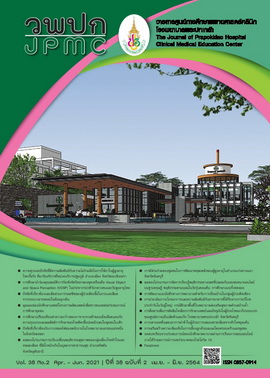The Factors Associated with Burnout among Private Hospital Staff in Songkhla Province
Main Article Content
Abstract
BACKGROUND: With the intensive competition of private hospitals, the roles of healthcare staff is to provide high-quality care with reliability, responsiveness and a short waiting time in order to achieve patient satisfaction. These stressful work conditions lead to negative effects on the staff’s physical and mental health resulting in burnout. Accordingly, the study to identify the factors influencing burnout is of importance, whereas there is a few studies among private hospital personnel.
OBJECTIVES: To explore the personal and work-related factors that contributed to burnout among healthcare staff in a private hospital.
METHODS: This cross-sectional study was conducted on a total of 550 hospital personnel in a private hospital in Songkhla province. The data were collected in November 2019 via an Internet questionnaire and burnout was measured by the Copenhagen Burnout Inventory (CBI). Multiple linear regression was performed for the data analysis.
RESULTS: Regarding the work-related factors, organizational stress, over commitment and long working hours revealed the association with all three dimensions of burnout while the effort reward imbalance had an influence on the personal and client-related burnout. The nurse group demonstrated risk for personal and work-related burnout. A traumatic life event was the only personal factor in association with all three dimensions of burnout. Additionally, the salary of 15,001-29,999 Thai Baht had a negative influence on client-related burnout.
CONCLUSIONS: Work-related factors were predominantly demonstrated their influence on burnout while the only personal factor was a traumatic life event. Correspondingly, interventions targeted at decreasing burnout in the workplace should consider both organizational and individual level focusing on attaining healthy organization climate and policy, diminishing burnout-related factors and enhancing individual coping and social skill with stressors, burnout and critical life events.
Article Details
References
Koch P, Kersten JF, Stranzinger J, Nienhaus A. The effect of effort-reward imbalance on the health of childcare workers in Hamburg: a longitudinal study. J Occup Med Toxicol [Internet]. 2017 [cited 2020 May 14]; 12:16. Available form: https://occup-med.biomedcentral.com/articles/10.1186/s12995-017-0163-8
Chambers CNL, Frampton CMA, Barclay M, McKee M. Burnout prevalence in New Zealand's public hospital senior medical workforce: a cross-sectional mixed methods study. BMJ Open [Internet]. 2016 [cited 2020 May 14];6(11):e013947. Available form: https://bmjopen.bmj.com/content/bmjopen/6/11/e013947.full.pdf
Messias E, Gathright MM, Freeman ES, Flynn V, Atkinson T, Thrush CR, et al. Differences in burnout prevalence between clinical professionals and biomedical scientists in an academic medical centre: a cross-sectional survey. BMJ Open [Internet].2019 [cited 2020 May 14];9(2):e023506. Available form:https://bmjopen.bmj.com/content/bmjopen/9/2/e023506.full.pdf
Chou LP, Li CY, Hu SC. Job stress and burnout in hospital employees: comparisons of different medical professions in a regional hospital in Taiwan. BMJ Open [Internet]. 2014 [cited 2020 May 14];4(2):e004185. Available form: https://bmjopen.bmj.com/content/bmjopen/4/2/e004185.full.pdf
Williams ES, Manwell LB, Konrad TR, Linzer M. The relationship of organizational culture, stress, satisfaction, and burnout with physician-reported error and suboptimal patient care: results from the MEMO study. Health Care Manage Rev 2007;32:203-12.
Friedman M. Medical diagnosis of type A behavior and its differentiation from type B behavior. In: Gullotta TP, editor. Type A behavior: its diagnosis and treatment. New York: Plenum Press, 1996. p.31-54.
Tanchaiswad S. The relationship between selected factors and stress of professional nurses at Songkhlanakarind hospital, faculty of medicine, Prince of Songkhla university [Dissertation]. Bankok: Mahidol University; 1989.
Buapetch A, Lagampam S, Faucett J, Kalampakorn S. The Thai version of effort-reward imbalance questionnaire (Thai ERIQ) : a study of psychometric properties in garment workers. J Occup Health 2008;50:480-91.
Phuekphan P, Aungsuroch Y, Yunibhand J, Chan SWC. Psychometric properties of the Thai version of Copenhagen burnout inventory (T-CBI) in Thai nurses. J Health Res 2016;30:135-42.
Mickey RM, Greenland S. The impact of confounder selection criteria on effect estimation. Am J Epidemiol 1989;129:125-37.
Dubale BW, Friedman LE, Chemali Z, Denninger JW, Mehta DH, Alem A, et al. Systematic review of burnout among healthcare providers in sub-Saharan Africa. BMC Public Health [Internet]. 2019[cited 2020 May 14];19(1):1247. Available form: https://emedicine.medscape.com/article/151597-overview.
Taka F, Nomura K, Horie S, Takemoto K, Takeuchi M, Takenoshita S, et al. Organizational climate with gender equity and burnout among university academics in Japan. Ind Health 2016;54:480-7.
Yeh WY, Yeh CY, Chen CJ. Exploring the public-private and company size differences in employees' work characteristics and burnout: data analysis of a nationwide survey in Taiwan. Ind Health 2018;56:452-63.
Ilić IM, Arandjelović MŽ, Jovanović JM, Nešić MM. Relationships of work-related psychosocial risks, stress, individual factors and burnout -Questionnaire survey among emergency physicians and nurses. Med Pr 2017;68:167-78.
Bagaajav A, Myagmarjav S, Nanjid K, Otgon S, Chae YM. Burnout and job stress among mongolian doctors and nurses. Ind Health 2011;49:582-8.
Hämmig O. Explaining burnout and the intention to leave the profession among health professionals - a cross-sectional study in a hospital setting in Switzerland. BMC Health Serv Res [Internet]. 2018[ cited 2020 Dec 22];18(1):785. Available form: https://bmchealthservres.biomedcentral.com/articles/10.1186/s12913-018-3556-1
Colindres CV, Bryce E, Coral-Rosero P, Ramos-Soto RM, Bonilla F, Yassi A. Effect of effort - reward imbalance and burnout on infection control among Ecuadorian nurses. Int Nurs Rev 2018;65:190-9.
Jachens L, Houdmont J, Thomas R. Effort-reward imbalance and burnout among humanitarian aid workers. Disasters 2019;43:67-87.
Mather L, Blom V, Svedberg P. Stressful and traumatic life events are associated with burnout-a cross-sectional twin study. Int J Behav Med 2014;21:899-907.

